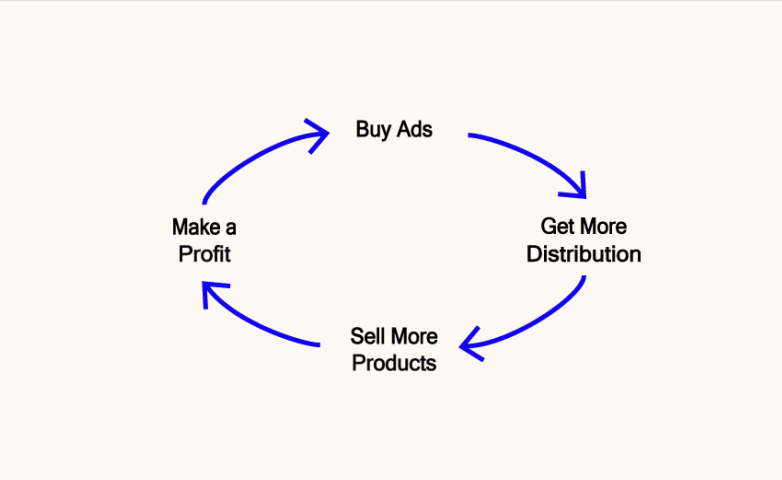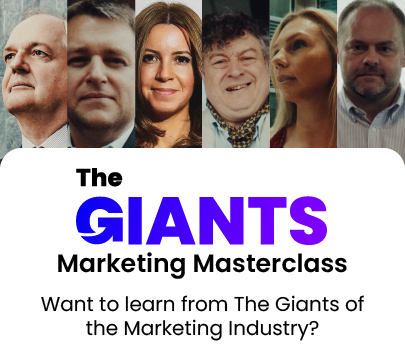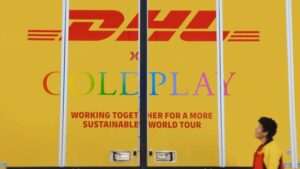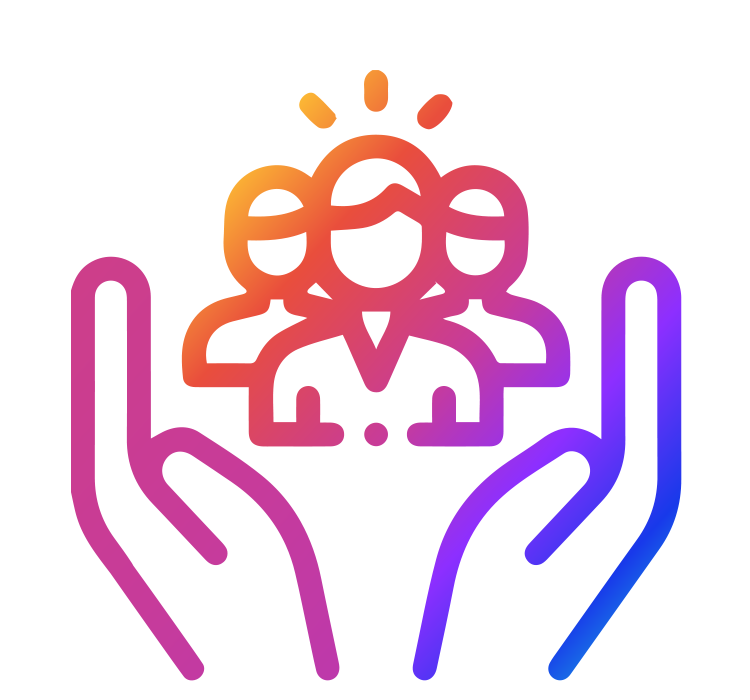“The world as we have created it is a process of our thinking. It cannot be changed without changing our thinking” Albert Einstein
I love this quote by Einstein as it inspires, overwhelms and excites me. Everything around us from the award-winning creative campaigns to innovative products that change the way consumers interact and behave first lived in someone’s mind before being released to the world.
In fact, it just goes to show that the power of thought shapes pretty much everything we as marketers do and that we are truly only restricted by our imagination. So let’s explore the mindset we need to adopt when it comes to marketing.
“You have to dare” Benjamin Braun, CMO of Samsung Europe
In order to truly have a point of differentiation and difference, Benjamin Braun, CMO of Samsung Europe says, “you have to dare”.

Seth Godin uses the analogy of a trapeze artist in a circus to highlight that often it comes down to mind over matter. In his words, “a timid trapeze artist is a dead trapeze artist” suggesting that it takes a certain mindset to leap confidently whilst also being willing to let go not only of the past but also how others may perceive your actions to have a chance to make it to the other side.
After all, even the most famous marketers have taken career defining risks with many naysayers at the time, who are only silenced by meteoric results.
“Marketing has changed more in the last 2 years, then in the last 50” Adobe
The truth of the matter is that marketing as a discipline is itself moving at an exponential rate. Adobe famously said, “marketing has changed more in the last 2 years, then in the last 50”. In many ways it’s a saturated space with falling barriers to entry and more and more companies trying to grab people’s attention. The way to achieve this has fundamentally changed, where once it was all about mass advertising (such as television or outdoor), what Seth Godin terms the TV industrial complex.
The job, according to Seth Godin, was to come up with ways to get “average people to buy average products”. This was largely achieved by placing ads mainly on TV, that drove sales and the profit reinvested back into advertising and so the cycle continued. It was so successful and all-encompassing that all marketers needed to do was rinse and repeat this process.
The TV Industrial Complex:

However, at the hands of digital this has fundamentally changed in so many ways, such as:
- There is a huge increase in the number of channels available that marketers have available to reach their customers, especially digital channels.
- Determining what media channels to use is also becoming increasingly automated based on data, known as programmatic buying.
- The type and format of creative execution has also fundamentally changed with a focus on delivery across multiple channels in a seamless and always-on way.
- The ability to ‘cut out the middleman’ and form direct relationships with customers in a very personalised way delivered seamlessly through automated channels.
- Offer a digital experience for the customer providing more cost effective and efficient ways of interacting in real time and therefore improving customer service delivery.
- The role of creativity has never been more important in order to stand out, such as the role of storytelling.
- Ability to be more authentic to communicate and deliver a proposition aligned to an organisation purpose.
There is no doubt that we were travelling in this direction as a matter of course, for instance, if you think about some of the world’s most successful brands today such as Google, Amazon, Spotify, Facebook, Uber to name but a few they all embrace the above principles.
So with so many wins and losers in this new digital era, the major question to ask yourself is how am I and my organisation going to succeed in this fundamentally new environment?
Well, to achieve this you must firstly adopt the right mindset to flourish as a marketer.
Here are a number of principles to consider and reflect on in order to achieve this:
1. Standing out
So if you are going to stand out, it’s truly time to throw out the rule book and challenge conventional wisdom and logic. Think about it – today everyone has access to the same wealth of information, so simply following the crowd is no way to give your marketing the magic it needs. In fact, one could argue it’s simply a shortcut to mediocrity.

Despite the potential, the reality is most of us drown out this inner voice, our ‘mind speak’ as it were, as we are worried about being judged for our ideas and creativity. We all have a degree of ‘imposter syndrome’ and worry about what others will think or how our ideas ‘will land’. However, it’s those of us who can train ourselves to translate our original ideas into action in a distinct way, leaving conventions behind, that will become truly remarkable. It’s a time to be brave and bold as in the words of Mastercard’s Chief Marketing Officer, Raja Rajamannar, “sailing the sea of sameness” just won’t cut it.
Fernando Machado, Chief Marketing Officer of Burger King and named in the top 100 creative minds list by Forbes magazine, acknowledges that in order to achieve world-renowned creative work, “doing things differently is not comfortable. And when people feel uncomfortable they get afraid. Most of the time when smart people are afraid they find many really good reasons for not going ahead with an idea. That’s why you need to understand that, to do something truly creative, you need to be willing to take a leap of faith.”
2. Test and Learn
One of the major advantages that digital marketing has is its ability to implement small scale tests and constantly iterate your approach, refining it as you go based on evidence and data. You must embrace this and be willing to become a master social scientist, where you are constantly challenging the assumptions of your activities and striving to constantly improve on results. For example, Google tested the blue colour variant within their logo over 300 times before they decided which one to use!

It’s important to combine insight (for instance, what the data is telling you) with your own intuition when carrying out experiments and be willing to push forward even when you lack perfect information or results. The environment is becoming increasingly unpredictable and therefore solely relying on past information is not a sure way to succeed.
3. Empathy is key
There is a famous quote by Jennifer Dukes Lee where she says, “in a world where you can be anything, be kind”. This is exactly the advice that we should all adopt in problem situations as we must recognise that change does not affect us all equally. It is often said, ‘be kind for everyone you meet as they are fighting a battle you know nothing about’.

The key principle to achieving this is to actually show a high degree of empathy for your customers and what they are going through. If you can achieve this you will be able to craft out relevant solutions that impact them both on a rational and emotional level.
Mimi Nicklin, Chief Creative Officer of RAPP (UAE) suggests that building empathy is very important during times of significant change. In fact, working very closely together with others to help develop a solution that is going to work is key. They must want to work with you and trust you to deliver and this is only achieved when you can really empathise with them.
Re-framing your perspective to one of understanding and empathy will also help you really be able to put yourself in others shoes. For example, during the recent pandemic we all increased our empathy for the selfless work of our usually under-recognised frontline service workers of the NHS. It was remarkable to see how individuals, businesses and the community came together to recognise and reward these individuals.
In a similar way, embrace this concept as a marketer in everything that you do. See your work through the eyes of the customer, supplier, employee and other stakeholders. Put yourself in their shoes when developing the customer journey, user experience, offers and promotions etc. Consider their objective, their motive and their intent and be willing to consider all sides of the coin before making a decision.
There is strong evidence of the commercial and customer benefits of doing so. For example, according to the Edelman Trust Barometer, 1 in 3 consumers felt that certain brands have not acted appropriately during the crisis and therefore have convinced others to stop using them. Whilst those brands who display a high degree of empathy both earned and kept a consumer’s trust.
4. Collaborate with others
You must begin to view marketing as a constant and ever-changing ecosystem where you need to work with a large range of stakeholders, agencies, colleagues and customers in order to bring exceptional work together. The ability to ‘take people on the journey’ is probably one of the most under-rated skills in all of marketing. Therefore, careful planning and consideration must be done at the outset to determine how you will collaborate with others in order to deliver value to the customer and organisation.
Digital technology has enabled you to achieve this more seamlessly and generate new insights and creative solutions. In fact, Rory Sutherland talks about the benefits of getting together remotely to have creative sessions. In conversation with him he has that in the past there was so much pressure to nail the idea in one session. Everyone in a room for hours determined to come up with ideas that can change the world. Now, by connecting remotely we can have multiple less pressured sessions where we can all have more time to collaborate, iterate and reflect in the gaps. This becomes far more powerful in the long-run.
This is echoed by Stephen Johnson in his book ‘Where good ideas come from’. He suggests that big workshops or creative sessions do not serve us well when it comes to idea generation. Rather we are far more likely to be innovative over days, weeks or months as we are stimulated by a variety of people, contexts and networks. What is interesting is his argument that the internet allows us to achieve greater connectivity which in reality could actually spar a whole new way of doing idea generation.
Here are some pointers to think consider when it comes to collaborating with others:
– Can you adapt your offering to be really helpful at times of change given the likely new social norms?
Think what supermarkets (separate opening hours for key workers), Uber eats (food left at your door), software (free trials for key individuals) are doing. By doing so you will generate a significant amount of trust with consumers.
– Be open to different, more flexible ways of working with clients. For example, can you offer a free-uim proposition at the moment where they get a sample product first and then once things settle down it moves into a more mutually-beneficial relationship.
– Some businesses may really be struggling with cash whilst others may be well liquidated. If you fall into the latter do help those in the former with things like extended or deferred payment terms etc.
– Partnering is a great way to add more value to your end customers
– Help others to help yourself – do that webinar or be that guest speaker.
– Create a platform for others or become a part of others, after all it was Zig Zidler who said, “You can get everything in life you want if you will just help enough other people get what they want.”
“You can get everything in life you want if you will just help enough other people get what they want.” Zig Zidler
5. Be passionately curious and become a creator
Marketing changes on a daily basis, there are always new products, services, innovations and changes in customer expectations taking place. Therefore, in order to succeed you need to develop a curiosity for the industry or adopt as Satya Nadella, says, “don’t be a know it all, be a learn it all”.
Just get started and chip away particularly in the quiet moments of your day. Imagine if you can improve your skills in different areas and become a better copywriter, illustrator, planner, analyst or creative.
Another way to achieve this is to become a creator yourself. You could start producing a podcast, blog, vlog; or master how to create a more engaged following on social; or honed in your SEO or PPC skills. This will lead you to incredible places and open doors you never thought possible.
You may well recall Steve Jobs’ famous commencement speech as Stanford University, where he talked about a calligraphy course that he took which at the time was a passion but of no real consequence (or so he thought). However, it formed the basis for the multitude of fonts that we now have today on our computers – imagine where we would be if he had never invested the time in that course!
The link between development and mindset is clearly articulated by Rob Moore who says, “You are the books you read, the films you watch, the podcasts & music you listen to, the people you meet, the goals you have and the conversations you engage in. Choose wisely what you feed your mind.”
The good news is that you are the master over what information, insights and entertainment you consume. There are so many ways to generate new thoughts, strategies and ideas. For instance, this could be from podcasts, to webinars, TED talks, reading or even just connecting with others on social media. By being open-minded and attracting these new positive references in your life has many subconscious benefits and it’s likely that you will start connecting thoughts and ideas in ways that you wouldn’t have otherwise. These dots in turn could open up new ways of thinking or indeed new opportunities.
6. Adopt a growth mindset
We have clearly learnt the power of the mind and its ability to shape outcomes in very tangible ways. It certainly relates to what Henry Ford said, “whether you think you can, or you think you can’t – your right”. He is of course referring to the power of the mind to be able to propel our thoughts and actions to achieve a goal. A related concept that puts us in a ‘growth’ frame of mind was developed by Carol Dweck that she terms a ‘growth mindset’. This is both the ability to undertake ambitious tasks and goals, and importantly having the grit to see it through. Furthermore, it’s about having the resilience to continue through the many failures you will experience along the way.
To explain it further, its worth contrasting what Dweck terms a “fixed” vs “growth” mindset. In her own words she says,
“In a fixed mindset students believe their basic abilities, their intelligence, their talents, are just fixed traits. They have a certain amount and that’s that, and then their goal becomes to look smart all the time and never look dumb. In a growth mindset students understand that their talents and abilities can be developed through effort, good teaching and persistence. They don’t necessarily think everyone’s the same or anyone can be Einstein, but they believe everyone can get smarter if they work at it.”
We can easily see how this applies to a business context. For instance, take the saying “it’s always been done this way”. This is clearly a “fixed” mindset that we often adopt in a business. Even when change is amidst and we recognise we need to adapt we find it extremely difficult as we are unable to break out of our “fixed” mindsets. By the way, we all believe we are open-minded and therefore find it even more difficult to recognise our own limitations when it comes to mindset.

















